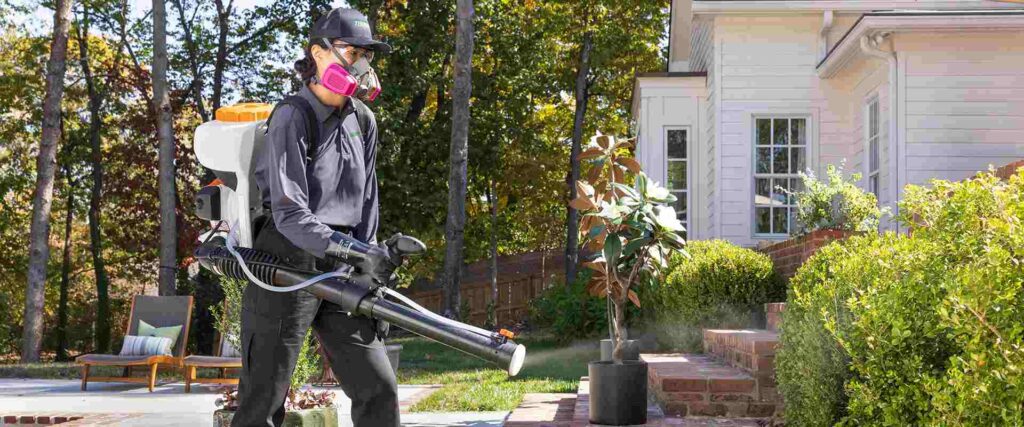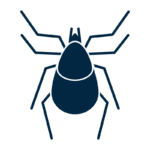-
Residential services
Residential services
Most popular package$102/moPest + termite planOur specialized termite treatments help minimize their presence, while our core management services keeps up to 20 other pests in check.Find your plan - Service areas
- About
- Special offers
- Contact
(877) 372-9696
5 most common pests in North Carolina - Identification and removal guide.
(877) 372-9696
or request your free quote
"*" indicates required fields
Table of contents
- 1. Mosquitoes: North Carolina’s most prolific bug.
- 2. Ants: Insect invaders in North Carolina homes.
- 3. Cockroaches: A persistent insect problem in NC.
- 4. Bed bugs: The nighttime pest in North Carolina homes.
- 5. Spiders: What you need to know in North Carolina.
- Get in touch with Terminix Triad for expert pest control in NC.
- Get a free quote

North Carolina is home to many pests, with some being much more prevalent than others. In this guide, we cover five of the most common ones in central NC, how to identify them, and effective methods to keep them out of your home.
1. Mosquitoes: North Carolina’s most prolific bug.
Mosquitoes thrive in the warmer months, especially in North Carolina. Characterized by long legs and thin bodies, these insects breed in even the tiniest water sources – as small as a bottle cap. Beyond their irritating bites, mosquitoes pose serious health risks by transmitting diseases like West Nile virus.
Mosquito prevention and control.
- Use repellent sprays containing DEET
- Wear clothes that cover more skin
- Tip or toss outdoor items that can collect or hold water
- Get professional mosquito reduction for comprehensive protection
2. Ants: Insect invaders in North Carolina homes.
Most often seen in the summer, ants are identifiable by their three-segmented bodies and their ability to get in through the smallest of cracks. These insects can contaminate food and damage property as they seek shelter and sustenance. Closely related to bees & wasps, some ants have a pretty potent sting.
Ant prevention and control.
- Keep a good bead of caulk on exterior cracks at windows & door jambs
- Reduce moisture conditions that cause wood to stay wet
- Set up ant traps and sprays
- Place boric acid powder on ant trails and near entry points
- Get professional help for severe infestations
3. Cockroaches: A persistent insect problem in NC.
North Carolina is home to three primary types of cockroaches, all of which can spread harmful bacteria and be hard to get rid of with store-bought solutions and DIY approaches.
German cockroaches
- Smallest and most prolific species (½-¾ inch)
- Light brown with two ‘racing stripes’ behind its head
- Has completely adapted to living with us – in our living spaces
- Extremely quick and resilient
American cockroaches
- Largest species (up to 2 inches – without the antennae)
- Reddish-brown in color with a light-brown ring behind its head
- Adults have full length wings but rarely fly
- Enter homes through sewer systems and outgoing drains
- Highly moisture-motivated
Smokybrown cockroaches
- Smaller than the American (about 1½ inch)
- Uniform mahogany brown with wings covering the adult’s entire body
- Enter through cracks in walls & chimneys from wood piles and old growth trees
- Exterior harborage occurs in places with little air flow
Cockroach prevention and control
- Keep inside spaces clean and outdoor areas free of clutter
- Periodically run water in sinks, tubs, and floor drains
- Seal exterior cracks in foundations and around chimneys
- Set up traps and baits and apply boric acid powder in areas with activity
- Get professional cockroach help for comprehensive control
4. Bed bugs: The nighttime pest in North Carolina homes.
Bed bugs are small, oval insects that feed on blood at night. Their reddish-brown or dark-red color and apple-seed size make them difficult to detect. While they don’t transmit diseases, bed bugs can cause significant discomfort and stress.
Bed bug prevention & control.
- While traveling and before unpacking, inspect for bed bugs by checking at the head of the beds
- Avoid bringing secondhand items inside without inspecting them first
- Use the clothes dryer on high heat for items you suspect have bed bugs
- Professional bed bug identification and treatment is strongly advised, as DIY methods may not address the source of the problem
5. Spiders: What you need to know in North Carolina.
North Carolina is home to several spider species. Most are harmless and actually beneficial by feeding on other household pests; however, venomous spiders like black widows spiders are quite prevalent in North Carolina.
Black widow spider
- Shiny black body with red hourglass marking
- Highly venomous
- Can be aggressive if provoked
Brown Recluse spiders are often feared, but are not native to North Carolina.
Wolf spiders
- Largest spider in the state
- Legspan can reach the size of a grapefruit
- Mottled brown bodies
- Don’t build webs and are active hunters
- Non-venomous, but bites can be painful and cause irritation
Cellar spider
- Very long legs found in basements and garages
- Pale and opaque in color
- Harmless
House spider
- Brown or gray bodies with irregular markings on the abdomen
- Responsible for the majority of the messy webs in corners and undisturbed spaces
- Generally harmless
Spider prevention and control
- Remove webs regularly to help keep spiders at bay
- Change exterior lighting to ‘bug bulbs’
- Control the other pests that the spiders are feeding on
- Get expert advice for concerns about spiders around your home
Get in touch with Terminix Triad for expert pest control in NC.
Early identification and action are crucial for managing pest problems. Before they compromise your health, peace of mind or property further, Terminix Triad can ensure you’re protected. Call 877-372-9696 or contact us today for your free quote!
(877) 372-9696
or request your free quote
"*" indicates required fields
